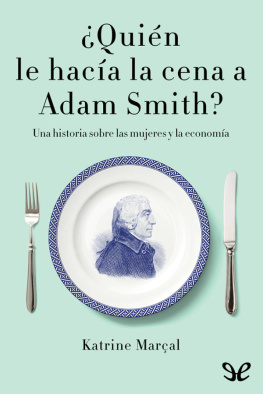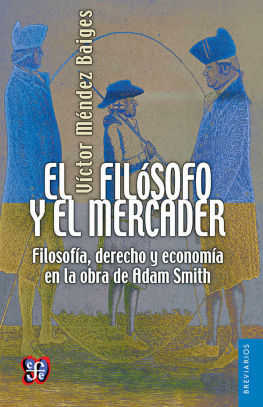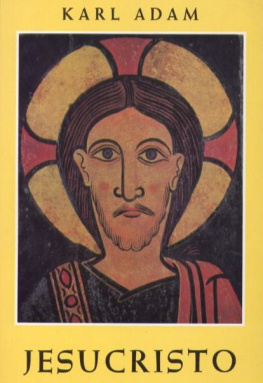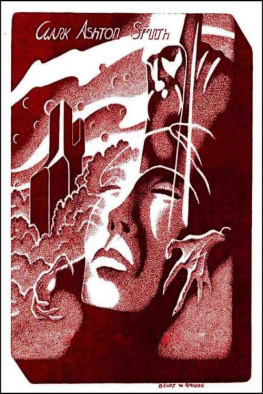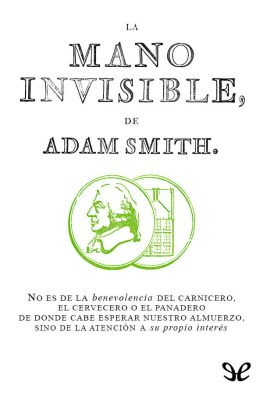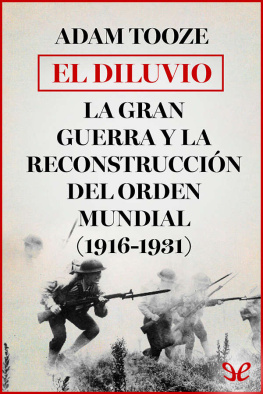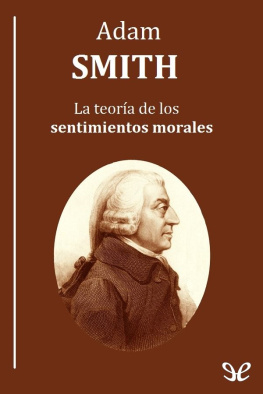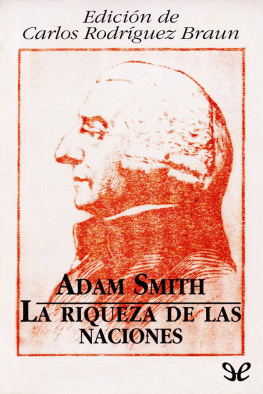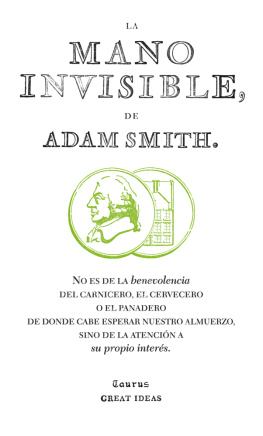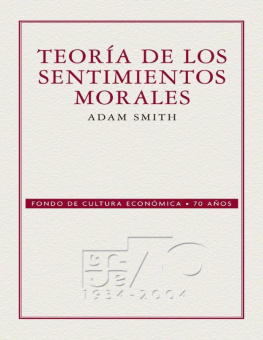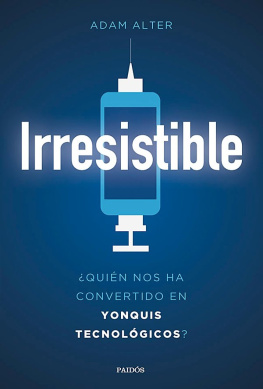Katrine Marçal - ¿Quién le hacía la cena a Adam Smith?
Aquí puedes leer online Katrine Marçal - ¿Quién le hacía la cena a Adam Smith? texto completo del libro (historia completa) en español de forma gratuita. Descargue pdf y epub, obtenga significado, portada y reseñas sobre este libro electrónico. Año: 2016, Editor: ePubLibre, Género: Historia. Descripción de la obra, (prefacio), así como las revisiones están disponibles. La mejor biblioteca de literatura LitFox.es creado para los amantes de la buena lectura y ofrece una amplia selección de géneros:
Novela romántica
Ciencia ficción
Aventura
Detective
Ciencia
Historia
Hogar y familia
Prosa
Arte
Política
Ordenador
No ficción
Religión
Negocios
Niños
Elija una categoría favorita y encuentre realmente lee libros que valgan la pena. Disfrute de la inmersión en el mundo de la imaginación, sienta las emociones de los personajes o aprenda algo nuevo para usted, haga un descubrimiento fascinante.
- Libro:¿Quién le hacía la cena a Adam Smith?
- Autor:
- Editor:ePubLibre
- Genre:
- Año:2016
- Índice:4 / 5
- Favoritos:Añadir a favoritos
- Tu marca:
- 80
- 1
- 2
- 3
- 4
- 5
¿Quién le hacía la cena a Adam Smith?: resumen, descripción y anotación
Ofrecemos leer una anotación, descripción, resumen o prefacio (depende de lo que el autor del libro "¿Quién le hacía la cena a Adam Smith?" escribió él mismo). Si no ha encontrado la información necesaria sobre el libro — escribe en los comentarios, intentaremos encontrarlo.
¿Quién le hacía la cena a Adam Smith? — leer online gratis el libro completo
A continuación se muestra el texto del libro, dividido por páginas. Sistema guardar el lugar de la última página leída, le permite leer cómodamente el libro" ¿Quién le hacía la cena a Adam Smith? " online de forma gratuita, sin tener que buscar de nuevo cada vez donde lo dejaste. Poner un marcador, y puede ir a la página donde terminó de leer en cualquier momento.
Tamaño de fuente:
Intervalo:
Marcador:
Bibliografía
Agence France-Presse, «Warnings Raised About Exodus of Philippine Doctors and Nurses», The New York Times, 27 de noviembre de 2005.
Akerlof, George A., y Robert J. Shiller, Animal Spirits. How Human Psychology Drives the Economy, and Why It Matters for Global Capitalism, Princeton University Press, 2009. [Hay trad. cast.: Animal spirits. Cómo influye la psicología humana en la economía, Barcelona, Gestión 2000, 2009].
Aktipis, Athena C., y Robert O. Kurzban, «Is Homo Economicus Extinct?», en R. Koppl, Evolutionary Psychology and Economic Theory, JAI Press, 2005.
Angier, Natalie, Woman. An Intimate Geography, Anchor, 2000. [Hay trad. cast.: Mujer, una geografía íntima, Barcelona, Debate, 2000].
Arrow, Kenneth J., «Models of Job Discrimination», en A. H. Pascal, Racial Discrimination in Economic Life, Lexington Books, 1972.
Aumann, Robert J., «War and Peace», discurso de aceptación del Premio Nobel, 8 de diciembre de 2005, http://www.nobelprize.org
Banerjee, Abhijit, y Esther Duflo, Poor Economics. A Radical Rethinking of the Way to Fight Global Poverty, Public Affairs Books, 2011. [Hay trad. cast.: Repensar la pobreza. Un giro radical en la lucha contra la desigualdad global, Barcelona, Taurus, 2012, trad. de F. Javier Mato Díaz].
Barker, Drucilla K., y Susan F. Feiner, Liberating Economics. Feminist Perspectives on Families, Work and Globalization, University of Michigan Press, 2004.
Beauvoir, Simone de, Le deuxième sexe, Gallimard, 1949. [Hay trad. cast.: El segundo sexo, Madrid, Cátedra, 2005, trad. de Alicia Martorell Linares].
Bebchuk, Lucian A., Alma Cohen y Holger Spamann, «The Wages of Failure. Executive Compensation at Bear Stearns and Lehman 2000-2008», Yale Journal on Regulation, vol. 27 (2010).
Becker, Gary S., The Economics of Discrimination, University of Chicago Press, 1957.
—, The Economic Approach to Human Behavior, University of Chicago Press, 1978.
—, A Treatise on the Family, Harvard University Press, 1991. [Hay trad. cast.: Tratado sobre la familia, Madrid, Alianza, 1987, trad. de Carlos Peraita de Grado].
—, «The Economic Way of Looking at Life», discurso de aceptación del Premio Nobel, 9 de diciembre de 1992, http://home.uchicago.edu/gbecker/Nobel/nobellecture.pdf
—, «Human Capital, Effort and the Sexual Division of Labor», en J. Humphries, ed., Gender and Economics, Edward Elgar Publishing, 1995.
Bereby-Meyer, Yoella, y Shelly Fisk, Is Homo Economicus a Five-Year-Old?, Ben Gurion University of the Negev, 2009.
Binswanger, Hans Christoph, Money and Magic. A Critique of the Modern Economy in the Light of Goethe’s «Faust», University of Chicago Press, 1994.
Booth, Alison, Lina Cardona-Sosac y Patrick Nolena, «Gender Differences in Risk Aversion. Do Single-Sex Environments Affect Their Development?», Journal of Economic Behavior and Organization, vol. 99 (marzo de 2014), pp. 126-154.
Brockway, George P., The End of Economic Man. Principles of Any Future Economics, W. W. Norton and Company, 1996.
Brown, Wendy, Edgework. Critical Essays on Knowledge and Politics, Princeton University Press, 2005.
Buckley, David, Strange Fascination – David Bowie. The Definitive Story, Virgin Books, 2000. [Hay trad. cast.: Bowie, una extraña fascinación, Barcelona, Ediciones B, 2001, trad. de Jordi Vidal i Tubau].
Caplan, Bryan, The Economics of Szasz. Preferences, Constraints, and Mental Illness, Department of Economics, Center for Study of Public Choice and Mercatus Center, George Mason University, 2005.
Center on Juvenile and Criminal Justice, From Classrooms to Cell Blocks, octubre de 1996, www.cjcj.org
Chait, Jonathan, The Big Con. The True Story of How Washington Got Hoodwinked and Hijacked by Crackpot Economics, Houghton Mifflin Harcourt, 2007.
Chuan Xu, Judith, «Poststructuralist Feminism and the Problem of Femininity in the Daodejing», Journal of Feminist Studies in Religion, vol. 19, n.º 1 (2003).
Cohen, Patricia, «A Textbook Example of Ranking Artworks», The New York Times, 4 de agosto de 2008.
Cowen, Tyler, «The Inequality that Matters», The American Interest, enero-febrero de 2011.
Croson, Rachel, y Uri Gneezy, «Gender Differences in Preferences», Journal of Economic Literature, vol. 47, n.º 2 (2009), pp. 448-474.
Davis John B., The Theory of the Individual in Economics. Identity and Value, Routledge, 2003.
Davis, Mike, y Daniel Bertrand Monk, Evil Paradises. Dreamworlds of Neoliberalism, New Press, 2007.
Defoe, Daniel, Robinson Crusoe, Wordsworth Editions, 1992 (1.ª ed.: 1719). [Hay trad. cast.: Robinson Crusoe, Madrid, Cátedra, 2000, trad. de Fernando Galván Reula].
Edgeworth, F. Y., Mathematical Physics, An Essay on the Application of Mathematics to the Moral Sciences, Reprints of Economic Classics, Augustus M. Kelley Publishers, 1967 (1.ª ed.: 1881). [Hay trad. cast.: Psicología matemática, Madrid, Pirámide, 1999, trad. de Jordi Pascual Escutia].
Edlund, L. y W. Kopczuk, «Women, wealth and mobility», American Economic Review, 99 (1), 2009, pp. 146-178.
Ehrenreich, Barbara, «Clitoral Economics», The Huffington Post, 22 de enero de 2008.
Feiner, Susan F., «Portrait of Homo Economicus as a Young Man», en Mark Osteen y Martha Woodmansee, The New Economic Criticism. Studies at the Intersection of Literature and Economics, Routledge, 1999.
—, «Reading Neoclassical Economics. Toward an Erotic Economy of Sharing», en Drucilla K. Barker y Edith Kuiper, Toward a Feminist Philosophy of Economics, Routledge, 2003.
Ferber, Marianne A., y Julie Nelson, Beyond Economic Man. Feminist Theory and Economics, Chicago University Press, 1993. [Hay trad. cast.: Más allá del hombre económico, Madrid, Cátedra, 2004, trad. de Pepa Linares].
Folbre, Nancy, The Invisible Heart. Economics and Family Values, New Press, 2001.
—, Greed, Lust and Gender. A History of Economic Ideas, Oxford University Press, 2010.
—, y Julie A. Nelson, «For Love or Money – Or Both?», Journal of Economic Perspectives, vol. 14, n.º 4 (2000).
Foucault, Michel, «The Birth of Biopolitics», en Michel Foucault. Lectures at the Collège de France, Palgrave, 2010. [Hay trad. cast.: Hay que defender la sociedad. Curso del Collège de France (1975-1976), Madrid, Akal, 2003, trad. de Óscar Horacio].
Fox, Margalit, «Betty Friedan, Who Ignited Cause in “Feminine Mystique”, Dies at 85», The New York Times, 5 de febrero de 2006.
Franklin, Sarah, «Fetal Fascinations. New Dimensions to the Medical-Scientific Construction of Fetal Personhood», en S. Franklin, C. Lury y J. Stacey, Off-Centre. Feminism and Cultural Studies, HarperCollins Academic, 1991.
Frey, Bruno, Not Just for the Money. An Economic Theory of Personal Motivation, Edward Elgar Publishing, 1997.
Friedan, Betty, The Feminine Mystique, W. W. Norton and Company, 1963. [Hay trad. cast.: La mística de la feminidad, Madrid, Cátedra, 2009, trad. de Magalí Martínez Solimán].
Friedman, Milton, «The Methodology of Positive Economics», en Essays in Positive Economics, University of Chicago Press, 1953. [Hay trad. cast.: Ensayos sobre economía positiva, Madrid, Gredos, 1967, trad. de Raimundo Ortega Fernández].
Galbraith, John Kenneth, A Short History of Financial Euphoria, Penguin, 1994. [Hay trad. cast.: Breve historia de la euforia financiera, Barcelona, Ariel, 1993, trad. de Vicente Villacampa Armengol].
Galenson, David W.,
Tamaño de fuente:
Intervalo:
Marcador:
Libros similares «¿Quién le hacía la cena a Adam Smith?»
Mira libros similares a ¿Quién le hacía la cena a Adam Smith?. Hemos seleccionado literatura similar en nombre y significado con la esperanza de proporcionar lectores con más opciones para encontrar obras nuevas, interesantes y aún no leídas.
Discusión, reseñas del libro ¿Quién le hacía la cena a Adam Smith? y solo las opiniones de los lectores. Deja tus comentarios, escribe lo que piensas sobre la obra, su significado o los personajes principales. Especifica exactamente lo que te gustó y lo que no te gustó, y por qué crees que sí.

